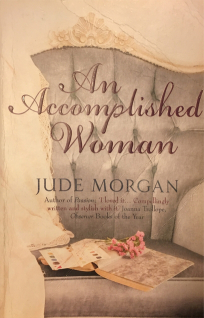

★★★★
While at home over Christmas, I spotted this novel on one of my mother’s bookshelves and promptly snaffled it without her knowledge (hi Mum!). Jude Morgan has drifted in and out of my awareness these last few years, but it wasn’t until I settled down with An Accomplished Woman that I realised he’s rather brilliant at Regency comedies of manners in a Georgette Heyer style. Indeed, I decided I was going to thoroughly enjoy it based on the final lines of the very first chapter. The rest of the book channels Heyer with aplomb, boasting a plot that has certain echoes of her novels, but Morgan infuses it all with a modern consciousness that gives it a warmly witty spark, and stuffs it so full of bon mots that I was kept busy scribbling them all down.
Lydia Templeton has just turned thirty and has accepted her status as a bluestocking old maid. Nine years earlier she caused a scandal by rejecting the proposal of her father’s eligible neighbour Mr Lewis Durrant, and now Lydia and Durrant have found a comfortable (if slightly prickly) equilibrium in which, unattached, they catalogue the absurdities of their social circle. Lydia is proudly independent (‘[I] do not feel the need to be completed by a husband, like the third volume of a novel‘), original (‘There is no greater tyranny… than convention‘) and avowedly cynical (‘Love is an infection best contracted and got over when one is young, like the smallpox; and then one may rest secure from it and get on with life‘). She happily keeps house for her scholarly father at their beloved Heystead Priory, reads journals and books in several languages and dares to engage in learned debates. Nothing, she is quite certain, could prove more conducive to her temperament than her present life. And so, when her godmother Lady Eastmond asks Lydia a favour – to accompany her impressionable young ward to Bath – Lydia is quite determined to say no. Unfortunately, a perfect storm of circumstances make her unable to do so.
First, she’s unwillingly charmed by Lady Eastmond’s ward. Phoebe Rae is beautiful, kind, intelligent and unbelievably naive. Her first London season has been such a success that she’s fallen head over heels in love with two different men and can’t decide between them. Both of them are coming to Bath in hot pursuit of Phoebe, and Lydia dreads the thought of the sweet, innocent girl being left alone to handle such a situation. Second, Lydia’s old flame Durrant has announced a startling plan to go to Bath himself, in search of a wife. He has put off marriage for long enough and now his extravagant nephew is blithely spending all of Durrant’s money on credit, feeling secure in his expectations. Durrant is the kind of vinegary man who would quite readily marry out of spite, if he had to. But his resolution fills Lydia with peculiar emotions. She believes that Durrant would be as unsuitable a suitor as he thinks she would be useless as a chaperone. And so they make a wager: whichever of them fails in their duty, must pay £50 towards Durrant’s new village school. Fortified by the pleasure of a bet, the company sets off for Bath.
Morgan sticks very carefully to the traditions of Regency novels, but he makes Lydia a little more worldly and a little less kindly than her equivalent would be in Heyer or Austen. Durrant, too, is more genuinely misanthropic than Heyer’s brooding heroes; which is not to say that he doesn’t have a certain tendresse for the right people. Of course, as Lydia and Durrant watch over the foibles of the young, you begin to realise that both of them have ‘problems’ which could be solved by a very easy step, if only pride wasn’t standing in the way. But that’s the charm of these books. It’s a rare Regency novel where you can’t see what should (and probably will) happen after the first chapter, but it’s the journey rather than the destination that counts. And Morgan’s journey is definitely one worth taking – preferably late at night, beneath a frosty moon, in a frantic dash to catch up with an eloping friend, in a curricle. Or at least a barouche.
My quest is now to find other novels by Morgan (which is actually a pen-name for the prolific author Tim Wilson). Generally speaking, ‘Morgan’s’ novels have met with warm critical acclaim and there are three or four other Regency comedies, along with books about the Romantic poets, the Brontes and Shakespeare, so you can be pretty certain that you’ll be seeing more of him on the blog in the not-so-distant future.
Buy the book
Share this:





